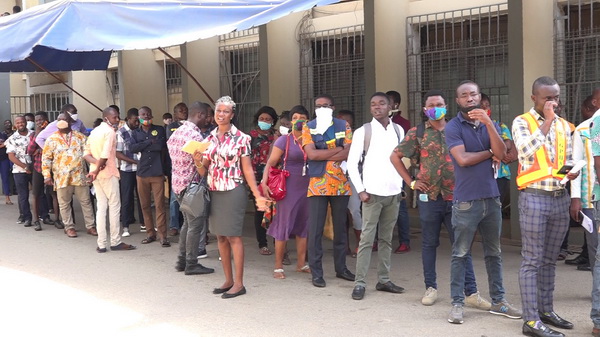The University of Cape Coast School of Business has organized the 6th and final session of the e-seminar series on the topic Coronavirus Pandemic: Global Marketing, Logistics and Supply Chain.
The seminar was held on 1st July 2020 and was chaired by Prof.Francis Amanquandoh, the Provost of the College of Humanities and Legal Studies. The Provost was happy to be part of the seminar series and praised the School of Business for the organization and inviting experienced discussants. He was particularly satisfied with the topics chosen for each session.
The Dean of the School of Business, Prof. John Gatsi, in his brief remark thanked all the discussants especially those from other universities in Ghana, Germany, the United States of America and South Africa as well as professional bodies. He said the blend of international and national academics on one hand and industry and professional bodies’representation on the other, demonstrates the strength of the School of Business in ensuring diversity and closer affinity with professional bodies in accounting, taxation, marketing, human resource, banking, corporate governance, procurement and supply chain. Prof. Gatsi called on businesses and employers to support the school in delivering it programs through online learning platforms to be as effective as face to face delivery. He said online teaching and learning require maximum discipline and congenial learning environment for students even though they are not congregating at a physical learning center. He, therefore, appealed to institutions and employers not to deny their workers leave during this sandwich session merely because the programmes are delivered online. He said granting leave to employees to participate in the online delivery mode or creating virtual learning spaces in offices to be used during scheduled lecture times is a great contribution to the efforts of the Business School as this will allow the students to fully participate. Prof. Gatsi also appealed to businesses to create innovative engagement with students by creating virtual internship opportunities for those interested to have their internship experience with them.
Prof. Dr. Jurgen Bode, a Professor of International Business and Deputy Vice-Chancellor for International Affairs & Diversity at the University of Applied Sciences, Bonn, Germany explained that COVID-19 has led to deglobalization in which many countries are focusing on their strategies within. He said, in some cases, businesses are diversifying and innovating with 100% raw materials and inputs from within their respective countries. Prof. Bode said though the Coronavirus Pandemic has disrupted global marketing, logistics and supply chain, it has led to a massive reduction in air pollution from the aviation and automobile industries. He also explained that in Germany COVID-19 stimulus packages are targeted to promote electric vehicles to sustain a reduction in air pollution and meet climate change expectations. Prof. Bode said COVID-19 has taught the whole world that, countries multinational companies and other businesses can cut down on travel costs and still be productive and relevant. He emphasized that Covid-19 has saved a lot of expenditure budgeted for the business, conference and other related travels by organizations. Prof. Bode challenged countries and organizations not to forget the core lessons when Coronavirus Pandemic is finally defeated.
Prof. Susan Powell Mantel, who is a Professor of Marketing and Associate Dean of Lindner College of Business, University of Cincinnati, USA said that global marketing was disrupted severely for some companies but created opportunities for other businesses through adaptation, innovation and diversification. She called on corporate bodies to be bold to review their business portfolio and strategies and ensure a good balance between risk and return during the pendency of the Coronavirus Pandemic. Prof. Mantel further advised businesses especially small and medium scale enterprises (SMEs )to engage in constant communication with their customers and clients. Sharing the American experience, she said America has huge domestic marketing, logistics and supply chain intensity and generates a diversity of internally sourced raw materials and suppliers. This she said minimized the level of disruptions.
Mr. Kwabena Agyekum who is the Executive Director of Chartered Institute of Marketing Ghana explained that COVID-19 teaches marketers to engage in constant communication and give continuous assurances their customers about their risks, products and services as well as their innovations. He said as marketers’ lessons learnt could still be relevant for future marketing strategies and therefore called on the department of marketing to write business cases involving various experiences of covid-19 for students and future leaders.
Prof. Daniel Agyapong, the Head of Department of Marketing and Supply Chain Management advised companies to identify and explore their local markets for their raw materials. He asked young businesses to revise their business models and form strategic alliances. Prof. Agyapong asked businesses especially startups to use mass advertisements like social media as it is cheap and effective.
Mrs. Nuzurat Aba Sam asked companies to create a diversified portfolio of suppliers and ensure that their suppliers are found within their countries, the sub-region, and globally. She explained that companies with only foreign suppliers were hard hit or suffered more than companies with alternative suppliers within their countries. She said many projects have stalled due to supplier challenges because of COVID-19 and not because of funds. Mrs. Sam explained that as a country we need to rethink an environment that can incentivize different types of suppliers of raw materials as a good lesson learned. She said when it comes to logistics, procurement and supply chain not everything can be done online because there must be time for actual delivery and production hence the severity of the pandemic on the sector.








